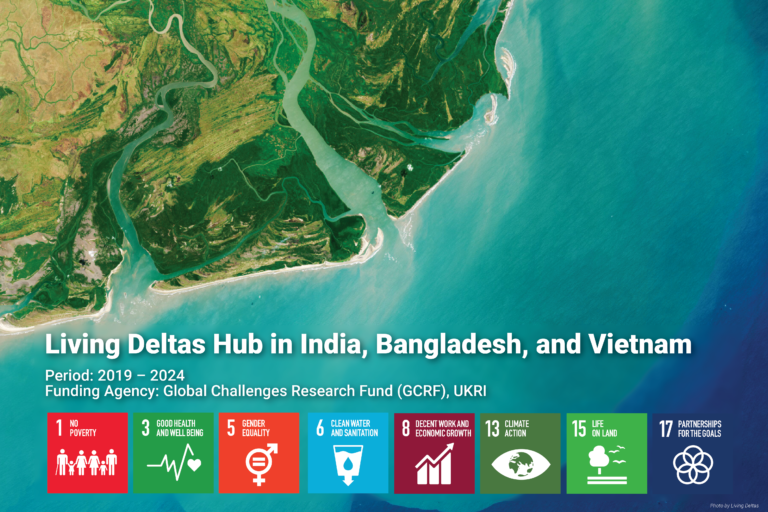ONGOING PROJECTS

PROJECT DESCRIPTION:
In the past decade, disasters in Asia and the Pacific have caused 225 million internal displacements, accounting for 78% of the global total. The 2023 Global Report on Internal Displacement shows that disasters caused by natural hazards led to 22.6 million new displacements in 2022 alone, nearly 70% of the global total. Meanwhile, displacement has been specifically recognised as “loss and damage” of climate change by the UNFCCC’s Task Force on Displacement. This recognition highlights the significant potential for future displacement as a result of the impacts of climate change, and the necessity for governments and their partners to invest in prevention and resilience building to avert displacement as well as preparedness and risk reduction, seeking to minimise displacement when it occurs.
Against this backdrop, the project titled, “Operational Foresight and Supporting Local Preparedness in the Context of Climate Displacement” aims to fill the existing gaps in disaster preparedness in the targeted countries through number of activities at the regional, national and local levels, focusing on strengthening the capacity of local operational actors in high-risk areas to prevent and prepare for possible future displacement. It is aimed to be done through improved foresight of potential future climate displacement risks, integration of improved data in planning processes, and support to the implementation of those plans through catalytic investments. Improved foresight will be the focus of the Risk Index for Climate Displacement (RICD) tool.
The project is supported by DG ECHO and is carried out in collaboration with IOM Asia Pacific and UP Resilience Institute. The project is conducted in three pilot countries: Indonesia, Philippines, and Fiji.
PROJECT DESCRIPTION:
The Lao People’s Democratic Republic (Lao PDR) relies heavily on its agricultural sector, which contributes 30% of the national GDP and supports approximately 80% of the population. However,
increasing climate hazards such as floods and droughts have significantly impacted agricultural productivity and livelihoods, particularly in Savannakhet Province.
Ecosystem-based Adaptation (EbA) has emerged as one of the important approaches, which integrates biodiversity and ecosystem services into climate adaptation strategies, ensuring cost-effective and practical solutions that can enhance resilience while promoting environmental sustainability.
The project, titled “Strengthening Climate Resilience of Agricultural Livelihoods in Savannakhet Province, Lao PDR through participatory Ecosystem-based Adaptation” aims to minimize the impacts of climate change on agricultural livelihoods through ecosystem-based adaptation. Ultimately, the findings of the research and stakeholder engagement will be leveraged to influence policymaking at the national level which removes barriers to a positive environment for EbA implementation and equitable climate adaptation policies which reflect the needs of marginalized groups.
The project is supported by Stockholm Environment Institute (SEI) Asia and Department of Foreign Affairs and Trade (DFAT), Government of Australia.

PROJECT DESCRIPTION:
The Climate Resilient Infrastructure for Social Transformation and Adaptation (CRISTA) is an innovative digital decision support system developed to enhance disaster and climate resilience of local government and vulnerable communities in Nepal through critical infrastructure risk management. The system comprises of a web-based computer dashboard integrated with geo-spatial database and a mobile application. The geo-spatial database contains multiple datasets on critical infrastructure and social infrastructure and the climate-induced hazards, vulnerabilities and risks to road and power infrastructure components. The mobile application functions as a two-way communication channel between the local authorities and the communities. It enables communities to report incidents (damage or disruptions in road or power infrastructure due to climate-induced hazards) to the CRISTA system while also receiving important updates and information from the local authorities regarding the status of infrastructure across the municipality. At the core of the system is the web-based computer dashboard, which enables local authorities to visualize the baseline geo-spatial data as well as the dynamic incident reports generated through the mobile application to monitor damages and disruption to road and power infrastructure in real-time, assess vulnerability, risk and impacts and formulate appropriate and timely response and risk mitigation strategies

PROJECT DESCRIPTION:
The project focuses on establishing a Knowledge Hub and enhancing capacity for Urban Ecosystem-Based Adaptation (EbA) in Lao PDR. It aims to explore ways to integrate EbA concepts and practices into the curriculum of the National University of Laos (NUoL). By promoting urban resilience, the initiative will develop five key project outputs (documents) that foster understanding and implementation of EbA strategies. These outputs include curriculum development guidelines, policy papers, capacity-building activities, and practical knowledge dissemination to support sustainable urban planning and climate adaptation.
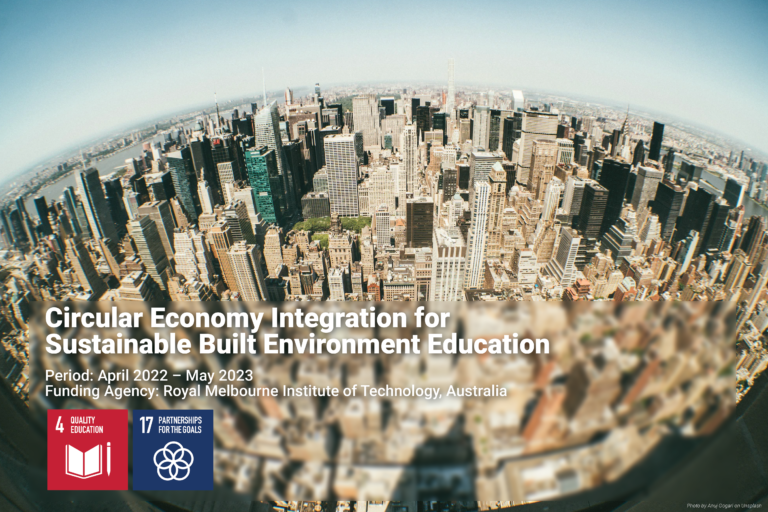
PROJECT DESCRIPTION:
On 28 July 2022, a webinar titled “Circular Economy Integration for Sustainability Education in the Built Environment and Other Disciplines” was held as part of a joint research project involving RMIT University and four partner institutions: the University of Peradeniya, TERI School of Advanced Studies, Asian Institute of Technology, and Arabaev Kyrgyz State University.
The two-hour session emphasized the crucial role of education in providing a comprehensive understanding of Circular Economy (CE) concepts and their application in both local and global built environment contexts.
During the webinar, five case studies from Australia, Sri Lanka, India, Thailand, and Kyrgyzstan were presented, showcasing initial data analyses and discussing the limitations of CE implementation confined to the basic ‘reduce, reuse, and recycle’ approach.
The presentations highlighted the necessity of advancing to higher-order R-principles, particularly focusing on ‘regeneration, refuse, and rethink,’ to effectively integrate CE into sustainability education.
Approximately 44 participants from academia, industry, and community organizations attended the webinar, engaging in discussions that underscored the importance of embedding advanced CE principles into educational curricula to foster sustainable development in the built environment and related disciplines.
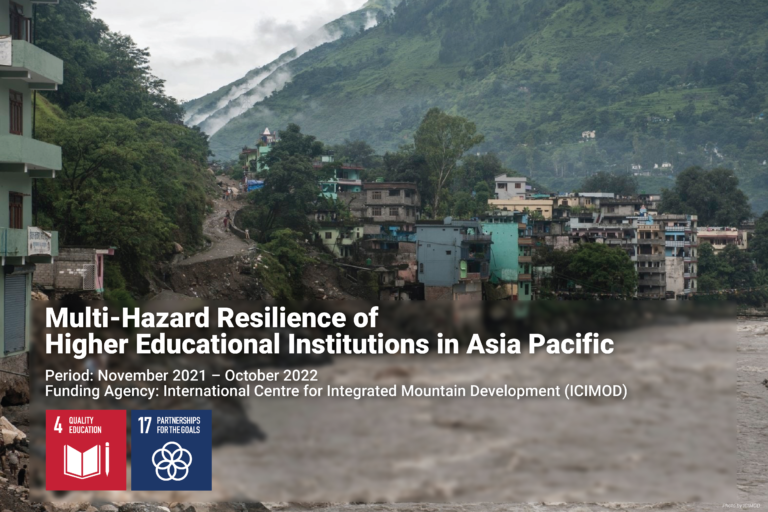
PROJECT DESCRIPTION:
This collaborative endeavour aims to facilitate the exchange of challenges, lessons learned, and innovative practices in preparedness, response, and recovery across various stages of the COVID-19 pandemic and beyond, through the presentation of comprehensive case studies. The primary goal is to cultivate stronger preparation and resilience among High Educational Institutions (HEI) for future crises. Furthermore, this initiative underscores the critical role of disaster risk reduction education within the higher education system, recognizing it as an essential element of disaster preparedness.
The response and adaptation efforts exhibited by HEIs during the COVID-19 pandemic, reflecting multi-hazard resilience, offer invaluable insights that can significantly enhance disaster prevention, mitigation, preparedness, response, and recovery capabilities within this context. Recognizing the importance of these experiences, the collaboration between the International Centre for Integrated Mountain Development (ICIMOD), the Asian Institute of Technology (AIT), and the Tata Institute of Social Sciences (TISS) underscores the need to harness these lessons.

PROJECT DESCRIPTION:
The PISCES partnership brings academic researchers together with business, industry, governments, NGOs, and civil society in a collaborative and inclusive way to understand and manage the risks posed by plastic pollution. It does this by addressing key knowledge gaps that are critical to unlocking a sustainable future for plastics in Indonesian societies. PISCES aims to inform, complement, and catalyse national and global action programmes to solve the plastic challenge – providing evidence-based solutions and system-change interventions to support real change in government policies, industrial practices, and consumer behaviour. The project’s systems approach brings environmental, economic, technical and social disciplines together to build scientific understanding of cultural and geographic drivers of attitudes and behaviours underlying plastic use and littering (in this case in the absence of collection infrastructure). It analyses ‘source to sink’ dynamics of plastic leakage and litter, as well as ecological and economic risks and impacts, and potential development of interventions that eliminate leakage of waste plastic into the Indonesian environment.
The PISCES project is carried out in collaboration with academic institutions, non-governmental organisations, government agencies and advocacy groups from the UK, Indonesia, Thailand, and beyond. The project is supported by UK Research and Innovation (UKRI) and the Global Challenges Research Fund (GCRF)

PROJECT DESCRIPTION:
CRISTA is Climate Innovation Project supported by FCDO (UK), the World Bank, and ADPC. The project is implemented by AIT in coordination with Action Nepal, FEED Pvt. Ltd, and Science Connect Ltd. in Nepal and Bangladesh. The project aims to support the decision-makers in addressing the risk by informing the near real-time status of critical infrastructure and improving the community-level climate resilience through risk sensitization.
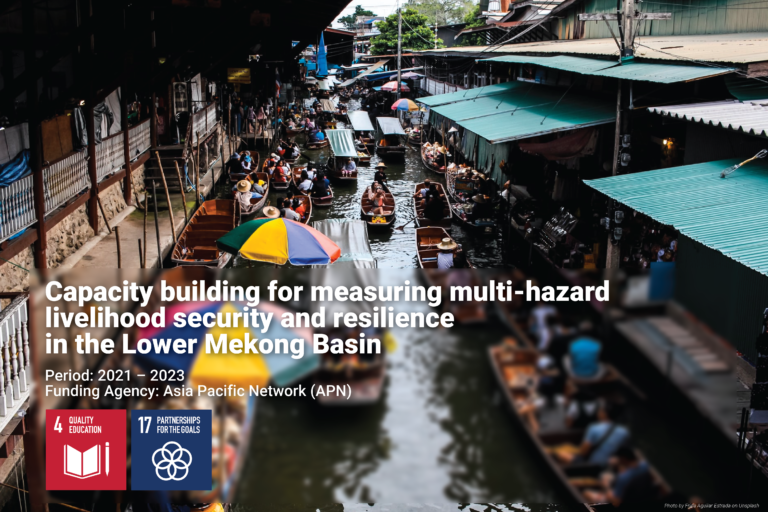
PROJECT DESCRIPTION:
The “Capacity Building for Measuring Multi-Hazard Livelihood Security and Resilience in the Lower Mekong Basin” project, supported by the Asia-Pacific Network for Global Change Research (APN), focuses on addressing the impacts of hydrometeorological hazards on livelihoods in this highly vulnerable region. A key milestone was the expert workshop held on May 30–31, 2022, by the Disaster Preparedness, Mitigation, and Management (DPMM) program at AIT. Regional experts shared insights on how hazards like floods, droughts, and landslides affect communities across Thailand, Cambodia, and Vietnam, highlighting the urgent need for adaptive strategies.
The workshop finalized the Livelihood Security and Resilience Assessment (LiSeRA) Framework, co-developed by Dr. Indrajit Pal and a multidisciplinary team. The framework provides an innovative tool for assessing multi-hazard livelihood security and resilience, aligning with multiple Sustainable Development Goals (SDGs). It is expected to aid policymakers, researchers, and development practitioners in building sustainable and resilient communities across the Lower Mekong Basin.

PROJECT DESCRIPTION:
South Asian countries, Nepal, Bangladesh, and India share the same Himalayan ecosystem and represent one of the world’s most diverse regions in terms of language, culture, religion and geography. The floodplain riverscape of Koshi River Basin (KRB) — from source to sink (e.g., Nepal to Bangladesh via India) is one of the largest river basins of Gangas in the Himalayas encompassing the diverse communities where people have maintained strong links to ecosystem dynamics and developed knowledge, practices, and institutions to accommodate recurrent disturbances and natural ecosystems, yet is also among the most vulnerable area to disasters (e.g., landslides, floods, and sedimentation). It has been acknowledged that integration of ecosystem-based local knowledge strengthens those ecosystems and in doing so enhance community resilience to impacts of climate change and disasters. However, such practices are neither well documented nor integrated into mitigation strategies. The main aim of this project is to identify, explain and develop a ‘proof of concept’ about Ecosystem-based Adaptation (EbA) to Disaster Risk Reduction (DRR) in the floodplain riverscape of the Koshi River Basin (KRB) in Nepal, India and Bangladesh. We will systematically document the state of traditional and local ecological knowledge (TLEK) to DRR, and evaluate the extent of resilience provided by TLEK using both empirical and theoretical frameworks.

PROJECT DESCRIPTION:
The project aimed to study the impacts of multiple hazards and cascading effects on key coastal critical infrastructures of Thailand. It intended to define the risk and sensitivity of the existing critical infrastructures on the eastern and western coasts of Thailand, considering systemic risk. The project successfully delivered a Coastal Critical Infrastructure Risk Assessment Matrix (CCIRAM), along with related knowledge products and tools.

PROJECT DESCRIPTION:
The project “Energy Demand Changes Induced by Technological and Social Innovations” was awarded to Bangabandhu Chair, AIT by the Research Institute of Innovative Technology for the Earth (RITE), Japan in December 2020. The main objective of the project is to create a research community with a focus on end-use, demand-side perspectives that further dialogue and cross-fertilization of research and policy analysis through data, concepts, and methodologies. The goal is also to develop a service-oriented bottom-up demand model to help in providing inputs to climate policy analysis.
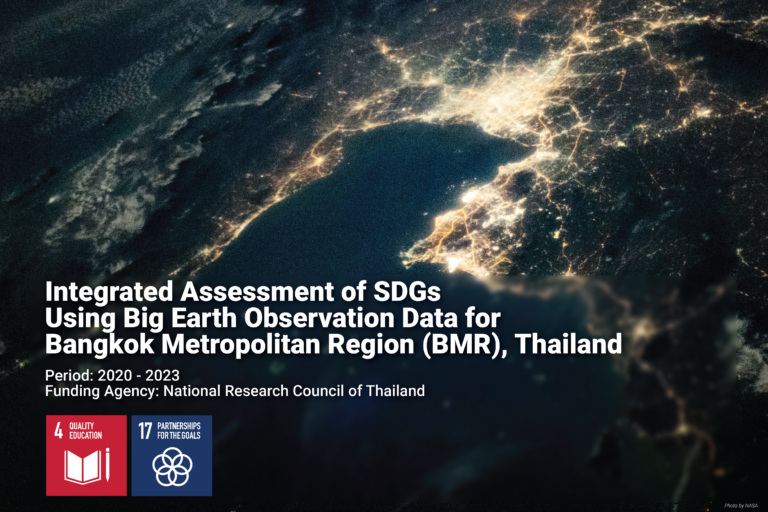
PROJECT DESCRIPTION:
In August 2019, Dr. Wenchao Xue from the Department of Energy, Environment, and Climate Change at the Asian Institute of Technology (AIT) delivered a talk titled “Integrated Assessment of SDGs Using Big Earth Observation Data for Bangkok Metropolitan Region (BMR).”
This presentation was part of the Digital Belt and Road Seminar organized by the National Research Council of Thailand (NRCT) in Bangkok and at Prince of Songkla University in Hat Yai. Dr. Xue discussed AIT’s research proposal focusing on utilizing extensive Earth observation data to assess Sustainable Development Goals (SDGs) within the BMR. Following the seminar, a project proposal was submitted to NRCT for funding consideration, aiming to establish a long-term collaboration under the Digital Belt and Road International Center of Excellence in Bangkok

PROJECT DESCRIPTION:
In June 2019, the Sindh Resilience Project, in partnership with the Sindh Provincial Disaster Management Authority (PDMA) and the Asian Institute of Technology (AIT), launched a capacity-building initiative aimed at enhancing disaster management capabilities in Sindh Province, Pakistan. Funded by the World Bank, the project focused on developing specialized curricula and conducting various training programs for provincial and district disaster management authorities, as well as government officials from multiple line departments. The initiative sought to strengthen disaster resilience through curriculum development, interactive workshops, and hands-on training sessions that addressed disaster risk reduction (DRR) and response strategies.
Led by Dr. Indrajit Pal of AIT, the project aimed to equip government officials with essential knowledge and practical skills for effective disaster preparedness and mitigation. By fostering knowledge exchange and building institutional capacities, the collaboration contributed to the long-term goal of improving Sindh Province’s resilience against future disasters
PROJECT DESCRIPTION:
The Living Deltas Research Hub was a five-year project (2019–2024) that operated across four delta systems: the Red River and Mekong deltas in Vietnam, and the Ganges-Brahmaputra-Meghna system in Bangladesh and India. These regions were considered socio-ecological systems facing numerous threats, including sea-level rise, saline intrusion, mangrove degradation, climate change, population
growth, land-use changes, and the health and well-being of delta communities. Additionally, unsustainable engineering interventions such as damming and sand mining exacerbated the degradation of these deltas. The Hub aimed to support delta countries in better achieving their UN Sustainable Development Goals (SDGs) Voluntary National Review agendas.
The project sought to address these challenges by fostering capacity-building through equitable partnerships, ensuring that its impact would extend beyond the five-year funding period. This ambitious research program, regarded as one of the most significant undertaken by the UK Research Councils, was truly interdisciplinary. It brought together experts from the natural and physical sciences, social sciences, and arts and humanities on an equal footing to develop innovative solutions. By building on existing research and co-producing knowledge, the Hub worked towards creating better futures for delta regions.






